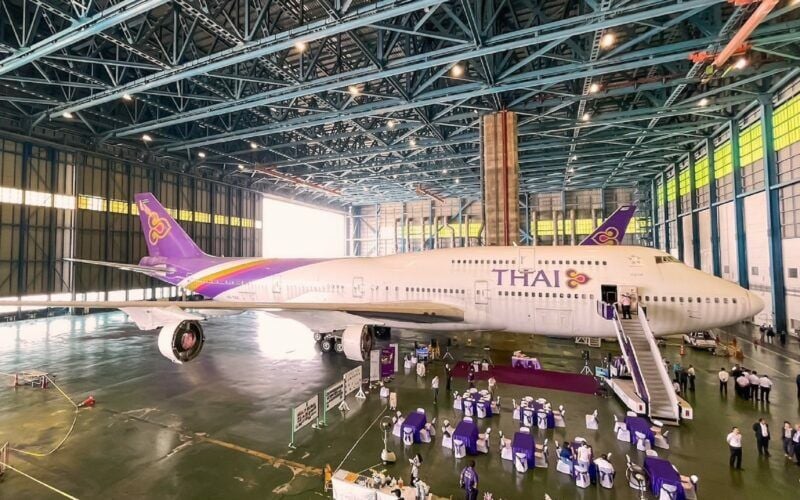Thai Airways bids farewell to iconic Boeing 747 ‘Queen of the Skies’

Thai Airways (THAI) officially bid a fond farewell to the legendary Boeing 747 ‘Queen of the Skies’ amidst a gathering of aviation aficionados and tearful staff in Thailand.
Prompted by the recent retirement of Air India’s remaining four Boeing 747-400s, THAI rolled out a majestic carpet, creating a grand stage to honour the original superjumbo jet that had graced their fleet.
The Thai airline shared a solemn moment on Tuesday, captured in a photograph from the retirement ceremony, revealing tables and chairs encircling the engineless Boeing 747-400 within a hangar.
“Queen of the Sky Farewell – Share your cherished memories with the Boeing 747, the iconic Queen of the Sky, as Thai Airways bids adieu.”
Originally slated for retirement by the end of 2024, THAI faced an unexpected twist with the onset of the Covid-19 pandemic. As a result, all Boeing 747s, except for the HS-TGF, were placed into storage in March 2020, with the final one joining them in Bangkok Suvarnabhumi Airport on December 31, 2020.
With the aviation industry gradually recuperating post-pandemic, the Boeing 747 became surplus to THAI’s, prompting the decision to bid farewell to this aviation icon. However, the Queen of the Skies wasn’t the only one facing retirement, as THAI also retired its six Airbus A380s.
Whilst THAI prepares to close this chapter, Lufthansa currently leads the pack, operating the largest fleet of Boeing 747-400s, with eight still soaring under the Queen of the Sky banner, reported Aerotime Hub.
Other airlines, including Atlas Air, Air Atlanta Europe, and Air China, continue to honour the legacy of the Boeing 747-400 in their fleets.
In related news, THAI realigned its Europe-bound flights to circumvent the Middle East following Iran’s onslaught on Israel. Concurrently, the Foreign Ministry has reported no immediate repercussions on Thai nationals in Iran and Israel.
THAI President Chai Eamsiri confirmed that the airline has made minor alterations to some flight paths to evade the Middle East airspace.
Latest Thailand News
Follow The Thaiger on Google News:


























